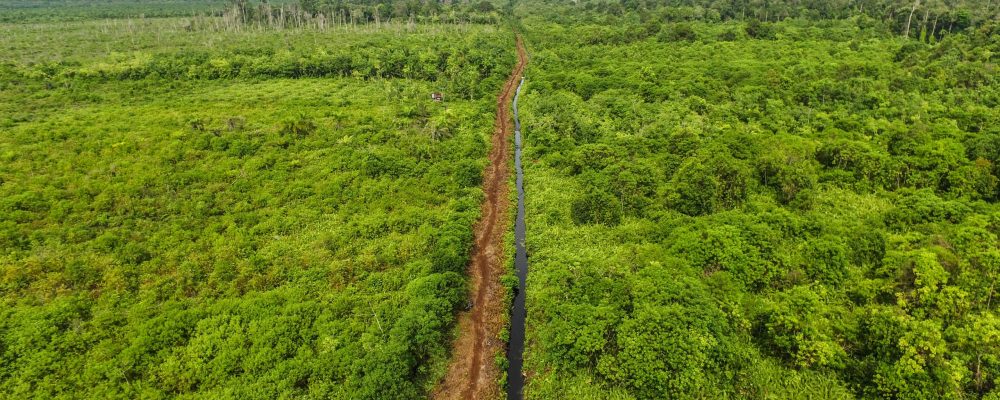
Following a one year delay due to the COVID-19 pandemic, 2021 culminated with world leaders meeting face-to-face in Glasgow for the UNFCCC’s 26th Conference of the Parties. Two major outcomes of COP26, the Glasgow Climate Pact and the Glasgow Leaders’ Declaration on Forest and Land Use, reaffirm global intent to achieve the Paris Agreement goal of limiting temperature rise to well below 2°C, with forests expected to become one of the key solutions. Through the Glasgow Leaders’ Declaration, 141 countries, representing 90 percent of Earth’s forest-cover, committed to collectively halting or reversing deforestation by 2030 as an essential course of action to achieve the Paris Agreement goal.
The Glasgow conference also marked the completion of the Paris Rulebook, following agreement on several previously unresolved issues. Notably, this included Article 6, to operationalize the use of international carbon markets in the context of the Paris Agreement as well as a transparency process to hold countries to account to deliver on their greenhouse gas (GHG) mitigation targets. The Paris Rulebook sets guidelines for countries to implement the Paris Agreement, across all sectors including forests and land-use.
The outcomes of the Glasgow climate conference align with the efforts of the UN-REDD Programme over the last decade and resonate particularly with the current strategic framework of UN-REDD. That includes implementing forest solutions to the climate emergency, mobilizing finance notably through performance-based finance and high-integrity carbon markets and enhancing ambition in the forest and land-use sectors. The seven UN-REDD partner countries that have accessed REDD+ Results-based Payments (RBPs) from the Green Climate Fund are providing an important proof-of-concept for the innovative performance-based finance scheme for forests solutions. They also show how UN-REDD support for comprehensive national and jurisdictional policy frameworks, transparent forest monitoring systems, accurate forest reference emission levels and robust approaches to social and environmental safeguards enable countries to reduce deforestation and attract the necessary international climate financing to sustain such sustainability pathways. These front-running GCF/RBPs countries, like Costa Rica, demonstrate that RBPs can be deployed to rapidly invest in sustainable forest management and conservation, benefiting targeted populations such as smallholders, rural women and indigenous peoples to yield increasing emissions reductions and a transition to sustainable livelihoods.
The ambitious, yet crucial, climate target of 1.5°C will remain out of reach without drastically scaled-up finance from the private sector. In 2021, UN-REDD engaged in a major global initiative to mobilize private funding for tropical forests. Launched during the Leaders’ Summit on Climate, and convened by the US government in April, 2021, the coalition for Lowering Emissions by Accelerating Forest Finance (LEAF) announced an initial record pledge of $1 billion in public-private finance for countries and jurisdictions to protect tropical forests. Five national and eight sub-national jurisdictions have now submitted successful proposals to the LEAF Coalition. Seven of the jurisdictions submitting successful proposals to LEAF were technically assisted by UN-REDD, and four of those jurisdictions have signed letters of intent to move towards emission reductions purchase agreements by COP27 at the end of 2022.
With over a decade of experience, the UN-REDD Programme is uniquely positioned to support ambitions that unleash the full potential of forest solutions to climate change. UN-REDD has set a mid-decade goal of helping to realize one gigaton of emission reductions from the forest and land-use sectors per year, together with helping to mobilize $5 billion of REDD+ results-based finance, including RBPs, carbon market transactions and other schemes under Article 6 of the Paris Agreement. Since 2008, the UN-REDD Programme has supported 65 countries in designing national and sub-national REDD+ policies and on-the-ground interventions, as well as facilitating the identification and establishment of financial arrangements to capture and manage results-based financing. UN-REDD has been instrumental in establishing good practices and codifying knowledge on landscape approach and planning, forest tenure, indigenous peoples’ rights, financing and private sector, forest monitoring systems and MRV, linking REDD+, the Paris Agreement, NDCs and the SDGs, REDD+ funding mechanisms, safeguards and gender. From the Glasgow climate agreements and pledges, UN-REDD is ready to help countries harness the growing amount of public and private financing available for forest solutions as they are a catalyst for transformations into low-carbon, socially inclusive and sustainable pathways.
The architecture for a new era in forest solutions and REDD+ action is now in place. The Glasgow Leader’s Declaration on Forests and Land Use, agreements on the Paris Rulebook, proof of concept for REDD+ readiness and Results-based Payments, GCF engagements in the REDD+ agenda, expanding public-private partnerships for forest financing and emerging carbon markets – all intend to serve forest solutions. The time for action is now. Together, FAO, UNDP and UNEP stand ready as the UN-REDD Programme continues to support countries in leveraging the full potential of forests to keep the 1.5°C goal alive – for people and for the planet.

Tiina Vähänen
Forestry Division
Food and Agriculture Organization of the United Nations

Pradeep Kurukulasuriya
Executive Coordinator - Environmental Finance
Bureau for Policy and Programme Support (BPPS)/Global Policy Network

Susan Gardner
United Nations Environment Programme

